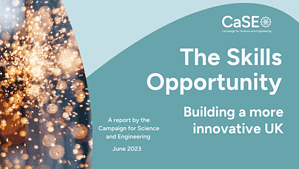Creating a highly skilled workforce and innovative economy is crucial to driving the UK’s economic prosperity. The correct framework of support and provision of skills can drive research and innovation to help solve global challenges, create new careers, and generate world-changing technologies.
Delivering a joined-up and integrated skills system
29 Jun 2023
Camilla d'Angelo
Policy Officer
CaSE alongside others in the R&D sector have recently been focusing on the skills needed to make the UK a more research and innovation intensive economy. In this piece we bring together some of the sector’s views and recommendations.
Over the past few years, the UK Government has set out its ambitions to be a science superpower with increases in the research budget and a new Department for Science, Innovation and Technology. But creating a more research-intensive UK is not going to happen without skilled people to work in the sector and a scientifically literate society.
In our recently published report, The Skills Opportunity, we highlight the need for a cross-Government approach to future skills requirements in the UK and discuss the need for a joined-up and integrated skills system. This will require coordination across different areas of skills provision—from science teaching in schools and advice on careers in science, technology and engineering, to higher and further education, apprenticeships, lifelong learning and immigration.
Others in the sector have focused on innovation in specific areas of provision, such as higher education and apprenticeships, as well as considerations around diversity and inclusion. Below we bring together some of this evidence and outline how an integrated approach can deliver high-quality skills to grow the UK economy.

Understanding skills gaps
The Westminster Government and devolved administrations need a better understanding of skills gaps to ensure supply can meet demand. There is currently no comprehensive mapping of the supply and demand of skills for science and technology, and the provision of skills is not always aligned with Government priorities or what employers need.
To help address this issue, the National Foundation for Education Research is carrying out a large-scale research programme that looks ahead to 2035 to identify what essential skills will be required in the labour market, the demand for these skills, and how they can be developed through the education system. Its results will feed into the Department for Education’s Local Skills Dashboard, which shows data on local skills, education and employment in England.
The Institute of Physics is also working to understand future demand for skills in a number of areas that make significant use of physics-related technologies, including identifying the anticipated changes in technology likely to drive demand for skills, the associated skills requirements, and existing and potential mechanisms for acquiring these skills.
NFER is leading a strategic research partnership, funded by the Nuffield Foundation, to identify the essential employment skills people will need for work by 2035.
Understanding the demand for physics-related skills across the economy, and how it will evolve, is a key part of ensuring the UK and Ireland benefit from the next industrial revolution.
Incentives and support for diversifying education and skills pathways
Measures such as the Lifelong Loan Entitlement, T-levels and the Apprenticeship Levy aim to raise the esteem of further and technical education and give adults the flexibility to retrain throughout their working lives. This is very welcome, given the importance of further education and lifelong learning in supporting research and innovation.
In recent years, there has been a decline in the uptake of apprenticeships in STEM areas, including engineering, manufacturing and technology. EngineeringUK have been supporting an inquiry to better understand the decline in uptake and identify solutions which could help to increase the number and diversity of young people taking up apprenticeships in the sector.
It’s clear that employers and individuals need incentives and support to make high-quality in-work training a viable option for those who want it. A report by the Institute of Physics also recommended that incentivising employers to invest in employees’ upskilling and reskilling is needed to bolster development of physics skills among the current and future workforce. This could come in the form of a tax relief on skills investment for businesses to encourage them to offer better and more flexible training. Smaller businesses would also benefit from support to reduce administrative burden and help them navigate the apprenticeship and training system.
If properly supported by Government, universities can play a critical role in an integrated skills system. That could be by engaging in partnerships to retrain and up-skill the UK’s workforce, as employers of highly skilled professionals from around the world, or by capitalising on a position of leadership and influence in their local areas.
A recent report by the Russell Group outlines how universities can build a secure skills pipeline for the UK. It highlights how universities are diversifying their offer, with lifelong learning and skills taking centre stage. This includes innovative teaching practices and industry partnerships that are informing the development of courses but also new pathways for students who want to study in a more flexible way. However, funding of quality teaching and learning represents an ongoing and growing challenge for higher education institutions.
In the long term, delivering on the UK Government’s ambitions for skills in science, technology and engineering will require a full commitment to providing funding for high-quality degrees alongside adequate and sustainable funding for the further education sector.
As the engineering and technology sector battles with acute skills shortage, a new inquiry seeks to explore concerning decline in apprenticeships uptake and find solutions to help with growing UK workforce.
A new report by the Russell Group, which represents 24 leading UK universities, has highlighted how learning in an innovative, high-quality, research intensive environment is giving students the skills they need to succeed and help grow the UK economy.
The geographical dimension of skills
The UK Government has committed to levelling up the economy and driving economic growth through focusing on regional R&D clusters. The focus on regional areas of R&D excellence will require considering skills requirements and challenges at a regional and local level, to ensure that different regions can attract talented scientists and researchers. It’s therefore vital that skills are considered as part of wider conversations about infrastructure, making the places where innovation happens places where people want to live, and promoting R&D opportunities in these areas.
A report by the IOP notes that physics-related industries are concentrated in specific geographical areas and highlights the importance of taking local industry needs into consideration when looking at industry-level skills gaps. They also found that young people are insufficiently exposed to local employers to understand that apprenticeships are viable and valuable education and career opportunities.
The Institute of Physics (IOP) has commissioned a first of its kind report, built on interviews with apprentices, their employers and training providers across the UK and Ireland, to set out the challenges and opportunities for physics-related apprenticeships.
Attracting international talent
Attracting international talent is also important, both to fill jobs in current areas of shortage but also to promote collaboration and knowledge exchange within research. The UK needs an attractive and inexpensive immigration system with visas that provide the flexibility skilled workers want. Analysis from the Royal Society found that total upfront immigration costs in the UK for scientists and researchers are much higher than in 16 leading science nations. In another analysis the Royal Society found that the total upfront costs of visas in the UK among the most expensive in the world, standing at £8,419, compared with an average of £1,316 for other leading science nations—a difference of 540 per cent. These costs are prohibitive for those least able to afford it, particularly early career researchers, and an evidence report by UKRI shows that this risks making the UK a less attractive destination compared to its competitors.
Fragomen LLP was commissioned by the Royal Society to update its 2019 analysis of upfront immigration costs in the UK and 16 other leading science nations.
Research and innovation is global. The UK needs an internationally competitive immigration offer to ensure talented people from overseas contribute to our world-leading science and help us grow.
This evidence report is based on the key findings of collated sources of evidence on the international mobility of researchers1, especially in relation to their entry to the UK, published between 2010 and 2021.
The importance of diversity and inclusion
Crucial to solving science, technology, engineering and maths (STEM) skills challenges is attracting, developing and retaining a diverse range of talented people to pursue careers in STEM. Evidence shows that there is an underrepresentation of particular groups in STEM, including women, ethnic minorities, people with disabilities and those from disadvantaged socioeconomic backgrounds. A lack of diversity means the STEM sector is losing valuable skills, experiences and perspectives, and cannot reach its full potential without greater diversity and inclusion in the workplace.
The Royal Society of Chemistry has conducted work on barriers to underrepresentation in the chemical sciences, including women, ethnic minorities, and those from disadvantaged socioeconomic backgrounds. Work on racism and ethnic inequalities in the chemical sciences highlighted underrepresentation of ethnic minorities in the chemical sciences and barriers to the retention and progression for black and minoritised ethnicity chemists. A report looking into the barriers facing women in the chemical sciences found that they disproportionately affect women’s retention and progression, resulting in many talented women leaving the sector before reaching their full potential. Evidence on chemistry education shows that students from less advantaged socioeconomic backgrounds face several barriers to studying chemistry at school and at university.
The IOP has highlighted challenges around diversity within physics-related apprenticeships and noted barriers to uptake for underrepresented groups. This includes stereotypes about apprenticeships leading to ‘low status’ jobs that compound wider stereotypes about who can do physics, as well as a lack of understanding about the wide range of careers physics can lead to. They call for challenging misconceptions about physics and the jobs it provides access to, which deter some young people, and supporting informed choices.
In a world where global challenges and advances in technology bring both uncertainty and new possibilities, the chemical sciences have a critical role to play.
Talented women, interested in an academic career, are leaving the sector before reaching their full potential. Many excellent female scientists who stay in academia are not progressing to senior grades in the same proportion as their male peers.
In our summary report, we include the calls-to-action for the people and organisations who have the power to make chemistry more accessible for all.
Conclusion
All these things and more make the research sector a linchpin of the UK’s skills future. By pulling together as a sector that cares about people and skills, we can influence government policy and seize the great skills opportunity with both hands.
Related resources

A week on from the publication, Policy Manager Camilla d’Angelo takes a look at some of the questions that remain to be resolved and what to expect next for the Immigration White Paper.

Policy Manager Camilla d’Angelo takes a look at what the Immigration White Paper means for attracting international R&D talent to the UK.

In advance of the forthcoming Immigration White Paper, CaSE and 35 other organisations have written to select Westminster Parliamentarians.

This briefing summarises attitudes to immigration, international students and researchers, and their impact on UK R&D. It is based on evidence from a nationally representative survey of 4,100 UK adults in June 2024 and two focus groups in December 2024.






